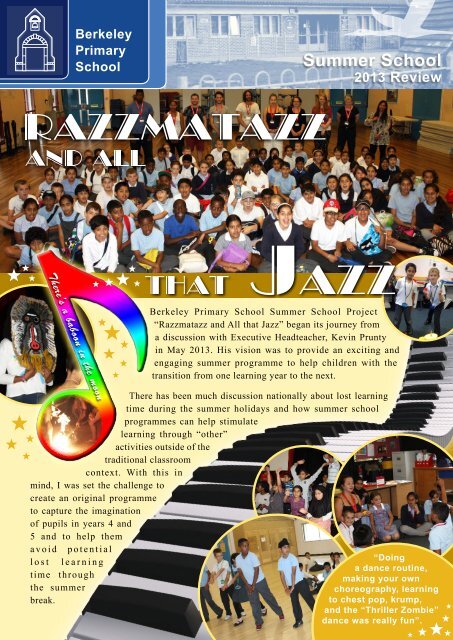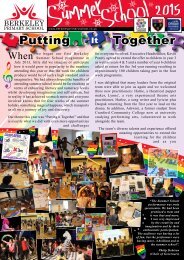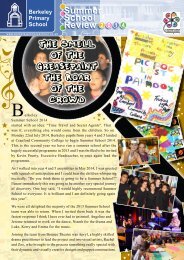Berkeley Academy / Primary School - Summer Camp 2013
Headteacher & Director: Keviin Prunty Editor-in-chief: Jessica Joyce Graphic design: Enzo Gianvittorio Danese (Enzo GD)
Headteacher & Director: Keviin Prunty
Editor-in-chief: Jessica Joyce
Graphic design: Enzo Gianvittorio Danese (Enzo GD)
You also want an ePaper? Increase the reach of your titles
YUMPU automatically turns print PDFs into web optimized ePapers that Google loves.
<strong>Berkeley</strong><br />
<strong>Primary</strong><br />
<strong>School</strong><br />
<strong>Summer</strong> <strong>School</strong><br />
<strong>2013</strong> Review<br />
<strong>Berkeley</strong> <strong>Primary</strong> <strong>School</strong> <strong>Summer</strong> <strong>School</strong> Project<br />
“Razzmatazz and All that Jazz” began its journey from<br />
a discussion with Executive Headteacher, Kevin Prunty<br />
in May <strong>2013</strong>. His vision was to provide an exciting and<br />
engaging summer programme to help children with the<br />
transition from one learning year to the next.<br />
There has been much discussion nationally about lost learning<br />
time during the summer holidays and how summer school<br />
programmes can help stimulate<br />
learning through “other”<br />
activities outside of the<br />
traditional classroom<br />
context. With this in<br />
mind, I was set the challenge to<br />
create an original programme<br />
to capture the imagination<br />
of pupils in years 4 and<br />
5 and to help them<br />
avoid potential<br />
lost learning<br />
time through<br />
the summer<br />
break.<br />
“Doing<br />
a dance routine,<br />
making your own<br />
choreography, learning<br />
to chest pop, krump,<br />
and the “Thriller Zombie”<br />
dance was really fun”.
A key focus of the <strong>Summer</strong><br />
<strong>School</strong>, jointly funded by<br />
<strong>Berkeley</strong> <strong>Primary</strong> <strong>School</strong> and<br />
Cranford Community College,<br />
was literacy and numeracy.<br />
Mr Prunty saw this as a great<br />
opportunity to continue developing<br />
these fundamental skills but through<br />
a non-traditional format.<br />
Working collaboratively<br />
with some amazing arts<br />
practitioners from the world<br />
of dance, theatre, music,<br />
visual arts and education, we<br />
devised a multi-arts programme<br />
to run for 4 weeks from the start of the<br />
summer holidays through to the middle<br />
of August. Working as 4 groups, fire,<br />
air, earth and water, each group spent one<br />
week learning arts specific skills in each<br />
arts specialism, whilst improving literacy<br />
and numeracy. Every Friday, all the<br />
groups came together and performed/<br />
shared through a workshop forum,<br />
what they had learnt. Each new week,<br />
the children took their prior learning<br />
and applied these new skills into the<br />
next arts specialism.<br />
“It was a great<br />
experience creating a<br />
drama script, practising for<br />
our performance and acting on<br />
the stage. We have learnt to face<br />
the audience when speaking, focus<br />
when acting; you need expression<br />
when acting”.<br />
“It was very useful learning to<br />
count and keep in time. I’ve<br />
learnt how a drum kit works<br />
and how electric guitars<br />
work”.<br />
By the end of the first week, there was<br />
a wealth of original material produced<br />
by the children which we could use to<br />
create a final performance piece. By<br />
the end of the third week we had so<br />
much amazing work from the children<br />
it was difficult to decide what to<br />
leave out and what should be drawn<br />
together into a complete storyline for<br />
a performance to parents and <strong>Berkeley</strong><br />
staff on the final Friday.
The learning process was a<br />
real journey of discovery, not<br />
just for the children but for the<br />
staff as well. The storyline was<br />
organic, making the learning even<br />
more exciting. By the end of week<br />
one, the children had begun to drive<br />
a storyline with an Island theme as the<br />
main hook for all the creative work<br />
which followed stimulating<br />
song writing, storytelling,<br />
dance routines, props and<br />
scenery for the characters<br />
to tell their story. From this<br />
hook came more adventurous<br />
journeys involving ship wrecks,<br />
an aeroplane crash, fire and water<br />
tribes, islands made of sweets<br />
and food. There is a Baboon in<br />
the moon, who steals<br />
the stars until<br />
the warring tribes<br />
learn to live in<br />
harmony and a<br />
wishing tree<br />
that can grant<br />
one wish to a<br />
deserving person.<br />
The story had a<br />
moral, a purpose and<br />
a message.<br />
“I<br />
really liked<br />
learning to make new<br />
decorations and adding<br />
different materials for<br />
design. I enjoyed a lot<br />
Mixing colours, designing<br />
and making something<br />
realistic”.<br />
At the start of week 4 they worked in their final<br />
arts specialism and then we gave the children a<br />
choice as to which arts specialism they wished<br />
to work in to create the performance. It didn’t<br />
take them long to have the plot sorted and for the<br />
final few days the whole group came together<br />
to form a <strong>Summer</strong> <strong>School</strong> Theatre Company.<br />
The performance was amazing. You could feel<br />
the excitement and pride from the children and<br />
the arts practitioners performing together this<br />
original piece of musical theatre written, devised<br />
and performed by them; the culmination of four<br />
weeks work. You could feel this sense of pride<br />
from the staff and parents who attended the<br />
performance, amazed by the quality and talent<br />
before them.
There is no doubt this<br />
summer school project<br />
achieved what it set out to<br />
achieve and more. It not only<br />
helped to improve literacy and<br />
numeracy but it developed the<br />
children’s social and life skills<br />
too; self-confidence, creativity,<br />
imagination, self-discipline,<br />
spatial awareness, team<br />
work, communication<br />
and so much more. They<br />
learnt, the history and<br />
facts of famous artists and<br />
performers, technical theatre<br />
terms, dance and music genres,<br />
how to make dance videos, (every<br />
group made one), cultural influences<br />
in the arts and the language of the<br />
arts and they got to learn all this<br />
from arts experts very talented in<br />
their chosen field.<br />
Watching the children grow in confidence,<br />
individually and collectively was inspiring.<br />
The whole experience seemed to transform<br />
them. Many parents commented on the<br />
change they had seen in their child<br />
during the process and hoped the<br />
same opportunity would be<br />
available for their younger<br />
children in the future.<br />
I am looking forward to<br />
<strong>Summer</strong> <strong>School</strong> 2014.<br />
Jessica Joyce<br />
(<strong>Summer</strong> <strong>School</strong> Organiser)<br />
“It<br />
helped<br />
build my<br />
imagination,<br />
because you learn<br />
while having fun”.<br />
“<strong>Summer</strong> <strong>School</strong> is the best,<br />
it was a fun place to learn. It’s<br />
a great opportunity for other<br />
kids out there”.





